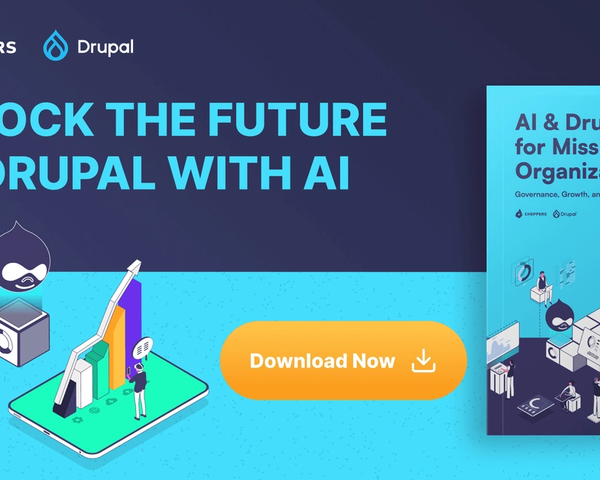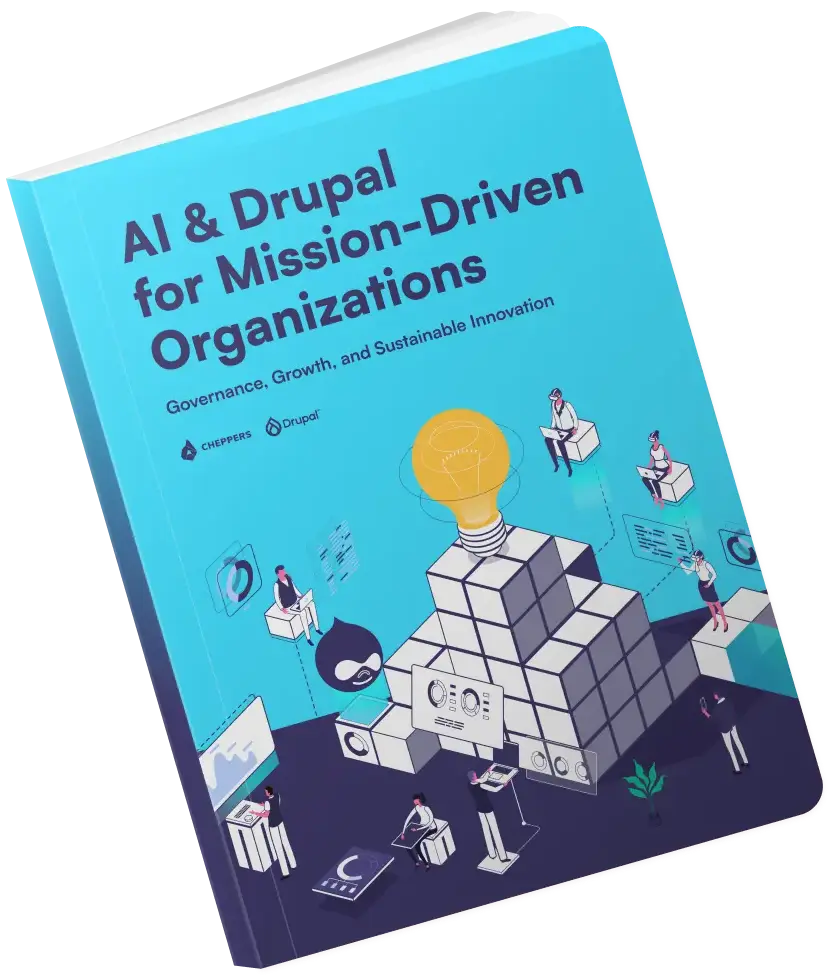Drupal SEO in the Age of AI
Search is no longer what it used to be. For many years the process was simple. People typed a question into Google, browsed the links that appeared, and clicked the result that looked most promising. Businesses, especially those running Drupal websites, built entire strategies around search engine optimization to capture those clicks and grow their audience.

Today the situation is very different. Many people no longer rely on Google alone. They ask questions directly to AI assistants. Google itself now produces summaries at the top of its search results, while millions of users prefer to use ChatGPT or similar tools instead of scrolling through a page of links.
This shift leads us to a critical question. Did AI kill SEO, or has it simply forced SEO to change?
The State of SEO Before AI
Before AI-driven search came along, SEO followed a predictable formula. Site owners chose keywords that matched the phrases people typed into search engines. They worked to gain backlinks from other sites in order to signal authority. They focused on technical improvements such as site speed, crawlability, and mobile responsiveness. They also used structured headings and meta tags to make it easier for search engines to interpret their content.
Drupal fit neatly into this landscape. Modules such as Metatag, Pathauto, Simple XML Sitemap, and Schema.org Metatag gave site owners precise control over how their content appeared in search results. Ranking higher in Google reliably meant more clicks, and more clicks meant more traffic. For a long time SEO was a stable and dependable growth strategy.
Then AI appeared and disrupted the entire process.
How AI Changed Search Behaviour
AI-powered tools have not only changed search engines, they have changed how people look for information. Instead of scanning through a page of links, many now expect an immediate answer.
The change has several consequences. AI systems often provide a direct summary instead of directing the user to a specific site. As a result, a Drupal page may still serve as the source of information, but the visitor never actually reaches it. At the same time, the importance of authority and structure has risen. Content that is shallow or created only to chase rankings rarely appears in AI-generated answers. Finally, habits are shifting. Many users are becoming accustomed to typing complete questions into AI-driven platforms and receiving a single, confident answer.
Google itself now places AI-generated summaries, sometimes called “AI Overviews,” at the very top of the results page. These overviews combine information from several sources and present it directly to the user. This means that the summary becomes the primary answer, and the linked websites become secondary. The risk for site owners is obvious: even high-ranking pages can be bypassed.
For Drupal site owners this creates a clear problem. Even if a page continues to rank well in Google, the actual traffic can decline because the essential information is already delivered within the AI summary.
Drupal SEO in the Age of AI
Although some argue that SEO is dead, the reality is more complex. SEO has not disappeared. It has evolved into something new.
AI does more than crawl and index pages. It interprets the information, reshapes it, and presents it directly to users. This means that pages created only for keyword rankings are no longer enough.
Here Drupal has an important advantage. The platform was built with structured content in mind. Content types, fields, and schema all contribute to a system that produces information that is both human-readable and machine-readable. AI systems prefer this kind of organized content.
The goal of SEO has also changed. Success is no longer defined only by being first in Google. It is now about becoming the source that AI systems trust enough to reference in their answers. Consider two Drupal travel sites. Both follow traditional SEO practices, but only one has schema markup, structured FAQs, and a comprehensive guide that covers the topic in depth. That is the site that will appear in an AI-generated summary.
It is important to remember that AI can also be used as part of the solution. It can help draft content, review headings and schema, and even highlight areas that may confuse an automated system. The proper use of AI is not a threat but a way to create the kind of material that AI systems then summarize. This is a central theme in our book called AI & Drupal for Mission-Driven Organizations, which explores how organizations can adapt Drupal to the realities of AI-driven search.
Therefore, Drupal site owners need to recognize that their challenge is not to chase rankings but to prove authority and expertise in a way that is clear to both people and AI.
What Drupal Site Owners Must Do to Stay Visible
Adapting to this new environment requires deliberate changes. These are the key priorities:
- Structure content clearly. Schema markup, which can be added through Drupal’s Schema.org Metatag module, allows AI systems to understand the context of a page. Clear headings and summaries give both people and machines a reliable overview of the information. An AI review agent can even check whether your schema is complete and whether headings make sense.
- Create comprehensive content. Instead of publishing many short posts that target narrow keywords, it is more effective to build pillar pages supported by interlinked articles. Drupal’s taxonomy and menu tools are ideal for organizing these clusters in a way that demonstrates authority.
- Demonstrate trust and expertise. Articles should include the author’s name, biography, and professional credentials. References to reputable sources reinforce authority, while a consistent site design signals professionalism.
- Maintain freshness. Outdated content can mislead users and AI systems. Drupal’s editorial workflows make it possible to schedule reviews, and AI tools can even generate lists of content that appears outdated or inaccurate. Running these checks regularly prevents your site from being cited incorrectly in AI-generated answers.
- Offer value beyond simple answers. AI can provide a one-line summary, but it cannot replace the experience of a detailed guide, an interactive calculator, or a multimedia resource. A Drupal site that explains the best time to visit Paris can also provide itineraries, downloadable checklists, or personalized recommendations that an AI cannot replicate.
These actions create a Drupal site that is both AI-ready and user-friendly.
From Surviving to Thriving in the AI Search Era
These priorities give Drupal site owners a practical way to adapt. However, they are not just a checklist to follow once and forget. They represent a shift in how SEO works in the age of AI. Structured content, freshness, and authority are no longer optional improvements. They are the foundation for being cited in AI summaries and for keeping human readers engaged once they arrive.
Success no longer comes from chasing keywords alone. It comes from producing content that AI trusts enough to summarize and that people value enough to explore further. For Drupal site owners, this is both a challenge and an opportunity. Drupal already offers the architecture needed to thrive in this new environment. What matters now is pairing that technical strength with a strategy built on clarity, authority, and meaningful content.
The future of SEO is not limited to search engines. It is about being present wherever people and the systems they rely on go for answers. That requires preparation, thoughtful planning, and sometimes a partner who has done this before.
If you want your Drupal site to thrive rather than simply survive, now is the time to act. A full SEO and AI-readiness audit can reveal where you stand and how to move forward. This is the path from adapting reluctantly to leading confidently in the age of AI-driven search.
Related posts

If you’ve been following this blog for a while, you may have noticed it’s been quieter than usual. That pause wasn’t because I ran out of things to write about. On the contrary, it was because I was writing something bigger, something that needed a different format than a single post or even a series of posts. That project became an e-book, AI & Drupal for Mission-Driven Organizations, and I’m happy to finally share it with you.

This blog post shows how to use Claude AI with GitHub Actions to automate code reviews in Drupal. It highlights how AI can improve code quality by suggesting better architecture, spotting issues, and asking smart questions—all integrated into your PR workflow.

